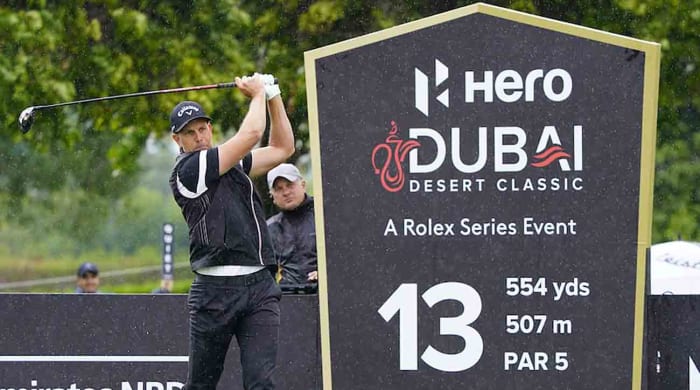More Weekly Read: Hard Feelings Persist Around LIV | LIV Golf’s Changing C-Suite | Go! Things
Unlike the PGA Tour, which was able to effectively ban members who played LIV Golf via suspensions or revoked memberships, the DP World Tour found itself last summer having to let otherwise good-standing members who had gone to LIV Golf to compete in the former European Tour events.
In essence, the golfers—16 of them, later reduced to 13 after the withdrawal of Sergio Garcia, Charl Schwartzel and Branden Grace—were granted an injunction allowing them to compete until the issue is resolved.
It’s not a court case, but rather an arbitration panel hearing, according to DP World Tour media officer Scott Crockett. It will be held at the Sports Resolutions Arbitration and Media Center in London beginning on Feb. 6 and ending on Feb. 10.
There is a three-person panel, with a former high judge who will serve as a chair. The proceedings will not be open to the public and an answer will not be quickly forthcoming, according to Crockett.
“The panel will deliver their verdict through the Sports Resolutions website several weeks after the hearing has taken place and have been given no definitive time when that will be by Sports Resolutions,” Crockett said last week in a media briefing with reporters in Dubai. “Will we appeal if we lose? Will they appeal if they lose? Will their players still be able to play on the tour if they are appealing? Unfortunately, the simple and honest answer to all of that is we don’t know.”
The three players who originally appealed the DP World Tour’s decision were Ian Poulter, Adrian Otaegui and Justin Harding. Their appeal allowed them to play in last summer’s Scottish Open. Lee Westwood, Sam Horsfield, Richard Bland, Shaun Norris, Laurie Canter, Wade Ormsby, Patrick Reed, Bernd Wiesberger, Graeme McDowell and Martin Kaymer later joined along with Garcia, Schwartzel and Grace.
Crockett said the hearing centers on the Tour’s conflicting event regulations and its ability to enforce those rules. “It’s as simple as that,” said Crockett, who went on to point out that the issues are not the same as the litigation between LIV Golf and the PGA Tour.

Henrik Stenson, by playing in Abu Dhabi and Dubai this month, has already met half the playing requirement for DP World Tour membership.
Eoin Clarke/Golffile
LIV has basically sued over antitrust issues and alleges that the PGA Tour is anti-competitive by not allowing its independent-contractor members the freedom to play golf outside of its Tour without restrictions.
Crockett noted the “difference in law between the UK and the US is vast. It’s also not about us suspending members or banning them from this or that. It’s simply to regulate on this narrow regulation point.
“These are rules for the players created by the players. We simply administer them on their behalf. As a member, each player signs up to these regulations when they pay a membership fee and the conflicting-member regulation has been part of our regulations for many years.
“There are precedents for us not granting releases in the past. Therefore, our argument is pretty straightforward. We believe we were and, indeed, we are within our rights to apply these sanctions now.”
Much like the PGA Tour, the DP World Tour has a release system in place to ensure that its tournaments are properly represented to sponsors and broadcasters. It requires permission to play outside of its events and, within reason, those permissions are granted.
The players who are fighting it obviously see this differently. They maintain they were allowed to play other tours in the past and still keep their European Tour membership.
“When all of us went to play on the PGA Tour back in the day, no one said we shouldn’t have been welcomed back,” Henrik Stenson said. “There are multiple tours in the world and as far as I’m concerned, as long as you fulfill your (membership) criteria and earn your right to be there, you should be able to play in as many tournaments as you like. haven’t had one player step up to me personally and vent those thoughts.”
The case is far more easily made in Europe. The DP World Tour requires its members to compete in just four tournaments outside of the major championships. A player such as Stenson, who competed in Abu Dhabi and Dubai, is already halfway to that stipulation.
It’s far more difficult on the PGA Tour where there is a 15-tournament minimum. Coupled with a 14-event LIV schedule, the idea of doing both seems a stretch.
Nobody knows how the UK case will play out. But clearly it’s going to be interesting to see the outcome and what it entails.
.